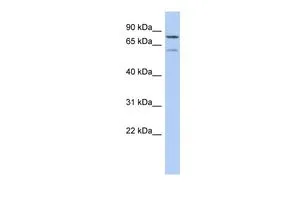
WB analysis of MCF-7 cells using GTX45178 OSGIN1 antibody at 0.2-1microg/ml.
OSGIN1 antibody, N-term
GTX45178
Overview
- SupplierGeneTex
- Product NameOSGIN1 antibody, N-term
- Delivery Days Customer9
- Application Supplier NoteWB: 0.2-2.5 ug/ml. *Optimal dilutions/concentrations should be determined by the researcher.Not tested in other applications.
- ApplicationsWestern Blot
- CertificationResearch Use Only
- ClonalityPolyclonal
- Concentration0.5-1 mg/ml
- ConjugateUnconjugated
- Gene ID29948
- Target nameOSGIN1
- Target descriptionoxidative stress induced growth inhibitor 1
- Target synonymsBDGI; BMSC-derived growth inhibitor; bone marrow stromal cell-derived growth inhibitor; OKL38; ovary, kidney and liver protein 38; oxidative stress-induced growth inhibitor 1; pregnancy-induced growth inhibitor OKL38
- HostRabbit
- IsotypeIgG
- Protein IDQ9UJX0
- Protein NameOxidative stress-induced growth inhibitor 1
- Scientific DescriptionThis gene encodes an oxidative stress response protein that regulates cell death. Expression of the gene is regulated by p53 and is induced by DNA damage. The protein regulates apoptosis by inducing cytochrome c release from mitochondria. It also appears to be a key regulator of both inflammatory and anti-inflammatory molecules. The loss of this protein correlates with uncontrolled cell growth and tumor formation. Naturally occurring read-through transcription exists between this gene and the neighboring upstream malonyl-CoA decarboxylase (MLYCD) gene, but the read-through transcripts are unlikely to produce a protein product. [provided by RefSeq, Aug 2011]
- ReactivityHuman
- Storage Instruction-20°C or -80°C,2°C to 8°C
- UNSPSC12352203
References
- Docosahexaenoic acid promotes the formation of autophagosomes in MCF-7 breast cancer cells through oxidative stress-induced growth inhibitor 1 mediated activation of AMPK/mTOR pathway. Tsai CH et al., 2021 Aug, Food Chem ToxicolRead more
- Docosahexaenoic acid increases the expression of oxidative stress-induced growth inhibitor 1 through the PI3K/Akt/Nrf2 signaling pathway in breast cancer cells. Tsai CH et al., 2017 Oct, Food Chem ToxicolRead more
